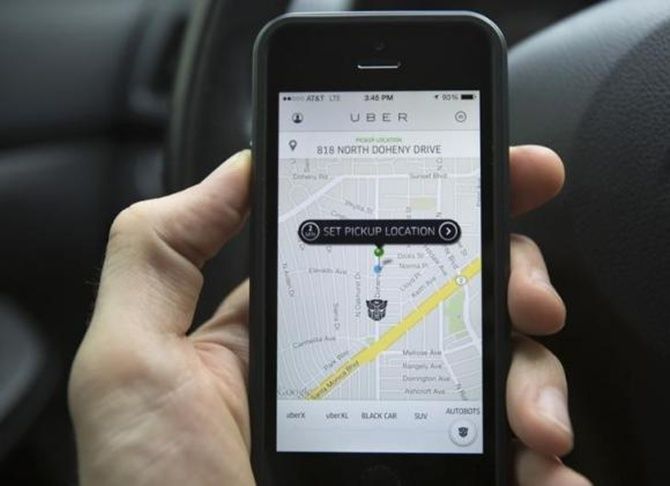
More companies with unconventional business models to get into messy legal hassles in India.
In mid-September, the Karnataka government slapped a tax-evasion notice on Amazon India sellers. Early this month, it was popular taxi-hailing service Uber that came under the lens of Indian tax authorities for allegedly not paying service tax.
Amazon is also being investigated by the Enforcement Directorate for violation of foreign direct investment (FDI) laws. And, the Reserve Bank of India (RBI) has ordered Uber and similar foreign internet-based firms to fix their payment mechanism and given them time until the end of October to comply with the Indian mandate of a two-step authentication system.
Experts expect more companies with unconventional business models to get into messy legal hassles in India. The regulations, particularly the income-tax law, perhaps, are not adequate to deal with new-age companies with complex structures, they say.
No one had envisaged such services 10 years ago, says Sivarama Krishnan, executive director at PricewaterhouseCoopers.
“The current tax regime does not have that flexibility and agility to deal with new innovations.” Krishnan argues that the system is still very rule-based. “The department takes a myopic view of things — either it ignores an issue completely or gets after it with all its might.”
There needs to be a greater discussion about how new-age companies fit into the system, considering just how significant India is becoming for their global operations.
The revenue they derive from India is swelling, too. That is what is landing them under the taxman’s lens. Since there are no black-and-white rules governing these companies, greater scrutiny is anticipated.

Prashant Singhal, global telecommunications leader at consultancy firm EY India recalls a conversation with a tax official after instant messaging service WhatsApp was sold to Facebook for a whopping $19 billion.
The official was of the view that since WhatsApp had a huge user base in India, it should have been taxed in India, too, he recalls. “This could not happen since WhatsApp is an American company with no physical assets in India,” Singhal adds. It is similar to the issue telecom major Vodafone Plc is fighting in the country.
The challenge facing regulatory authorities concerning new-age technology companies is not limited to India.
According to a New York Times report last week, “the New York State attorney general said most Airbnb (a platform to rent out lodging) listings in the city violated zoning and other laws. Officials in California and Pennsylvania recently warned car services like Uber and Lyft that they might be unlawful. And workers’ rights advocates questioned whether the people who provided these services should receive benefits.”
 On-demand start-ups are betting that if they get enough consumers on their side, regulators will eventually come around, writes Claire Cain Miller of the NYT. “This libertarian, independent streak that runs through Silicon Valley compounds the issue,” Julie Samuels, executive director of Engine, which advises start-ups on policy told Miller.
On-demand start-ups are betting that if they get enough consumers on their side, regulators will eventually come around, writes Claire Cain Miller of the NYT. “This libertarian, independent streak that runs through Silicon Valley compounds the issue,” Julie Samuels, executive director of Engine, which advises start-ups on policy told Miller.
“The good side is, it created this environment where people came together and made crazy amazing stuff that changed the world. The flip side is, sometimes it makes it difficult for those companies to engage,” the report quotes Samuels as saying.
Rules are being evaluated by OECD (Organisation for Economic Co-operation and Development) member countries and there is expected to be greater “deliberation and discussion” on how they share tax revenues from these services, since internet companies lack any territorial boundaries, EY’s Singhal told Business Standard.
According to the service tax department, Uber is gaining revenues from its services in India but is not paying any service tax here. The department does not feel the law can be interpreted in any other manner, so it wants Uber to pay from its own pocket or collect it from the cabbies and deposit with the service tax department.
“There is no grey area; either Uber has to pay or the taxi driver has to pay. We have told them, if they are not willing to pay, they will have to give us the addresses of all taxi drivers in India with whom they have tie-ups. It is for them to decide now,” says Mumbai Service Tax Commissioner S K Solanki.
 Since the San Francisco-based company is operating out of its Netherlands arm, its Indian unit, Uber Systems Pvt Ltd, which handles payments from customers in India, will have to pay the tax.
Since the San Francisco-based company is operating out of its Netherlands arm, its Indian unit, Uber Systems Pvt Ltd, which handles payments from customers in India, will have to pay the tax.
Authorities are also asking for 12.36 per cent service tax on the fee Uber receives from drivers for connecting them with customers over an app.
At present, Uber takes the services of existing taxi operators; it does not own any fleet or have any driver on rolls. When a customer books a service through the Uber application and pays for it through credit card, the payment is directed to Uber’s Netherlands unit. After deducting its revenue share, the money is redirected to the taxi driver in India.
Uber, on its part, maintains that it complies with all applicable tax laws, and pays the relevant tax in every territory where it operates. The company also said in a response to a Wall Street Journal report that “all payments on the Uber system are cashless and fully traceable in an industry that has been notoriously cash-based for years”.
Uber and WhatsApp did not respond to a Business Standard query.
Singhal says Uber is providing a mechanism for cab service providers to reach their consumers and the company is “facilitating the process sitting outside India”. Since there is no framework to tax such kind of revenue flow under the current law, the taxman is struggling to understand the business model of many such companies. “Principally, Uber is right, but the law has to catch up with it and others,” says Singhal.
 In the case of Amazon India, the state tax collectors are arguing that the e-tailer’s dealers are listing Amazon warehouses as an additional place of business, value-added tax should be paid on it. Amazon India has refuted it, saying if it pays sales tax it will seem the company is selling goods directly to consumers — something that will run afoul of the FDI norms.
In the case of Amazon India, the state tax collectors are arguing that the e-tailer’s dealers are listing Amazon warehouses as an additional place of business, value-added tax should be paid on it. Amazon India has refuted it, saying if it pays sales tax it will seem the company is selling goods directly to consumers — something that will run afoul of the FDI norms.
They have now been given a month’s notice to figure out a mechanism to comply. A spokesperson for Amazon India says the company is awaiting a resolution and “will cooperate with the government on resolving the issue”.
Uber also came under the spotlight after RBI said foreign service providers offering services in India had to follow the mandated two-step authentication process for payments. Governor Raghuram Rajan was quoted as saying: “If there is a rule on the book, we do not allow it to be violated simply because the innovation is cool.” The Central bank gave all such companies a deadline of October 31 to comply.
PwC’s Krishnan is of the view that most multinationals operating in India do not want to evade tax but surely look for ways to optimise it. But when India fails to reach a middle ground, it sends wrong signals to the global investor community. “The same logic might apply to Indian software services companies that work for clients in the US sitting in India and do not pay taxes in that country,” argues Krishnan.
 At present, taxi operators do not even record the income. Since payments through Uber are electronic, taxi operators will be forced to book their revenues, he says. “Income tax may lose some three-four per cent of tax but the service tax collection could go up by 13-14 per cent,” Krishnan adds. Today, most of this income is unaccounted for and, therefore, untaxed.
At present, taxi operators do not even record the income. Since payments through Uber are electronic, taxi operators will be forced to book their revenues, he says. “Income tax may lose some three-four per cent of tax but the service tax collection could go up by 13-14 per cent,” Krishnan adds. Today, most of this income is unaccounted for and, therefore, untaxed.
“Somewhere you have to take a call on how liberalisation of tax regime can create more economic activity, which gets offset by some of this minuscule tax loss,” Krishnan says. “The focus the world over is to create more economic capital.”
IN THE MIDST OF TROUBLE?
- Uber has drawn attention of Indian tax authorities for allegedly not paying service tax
- Amazon is also being investigated by ED for violation of the FDI laws
- Recently, RBI ordered Uber and similar foreign internet-based firms to fix a payment mechanism
- The firms have time until October 31 to comply with the Indian mandate of a two-step authentication process











 © 2025
© 2025